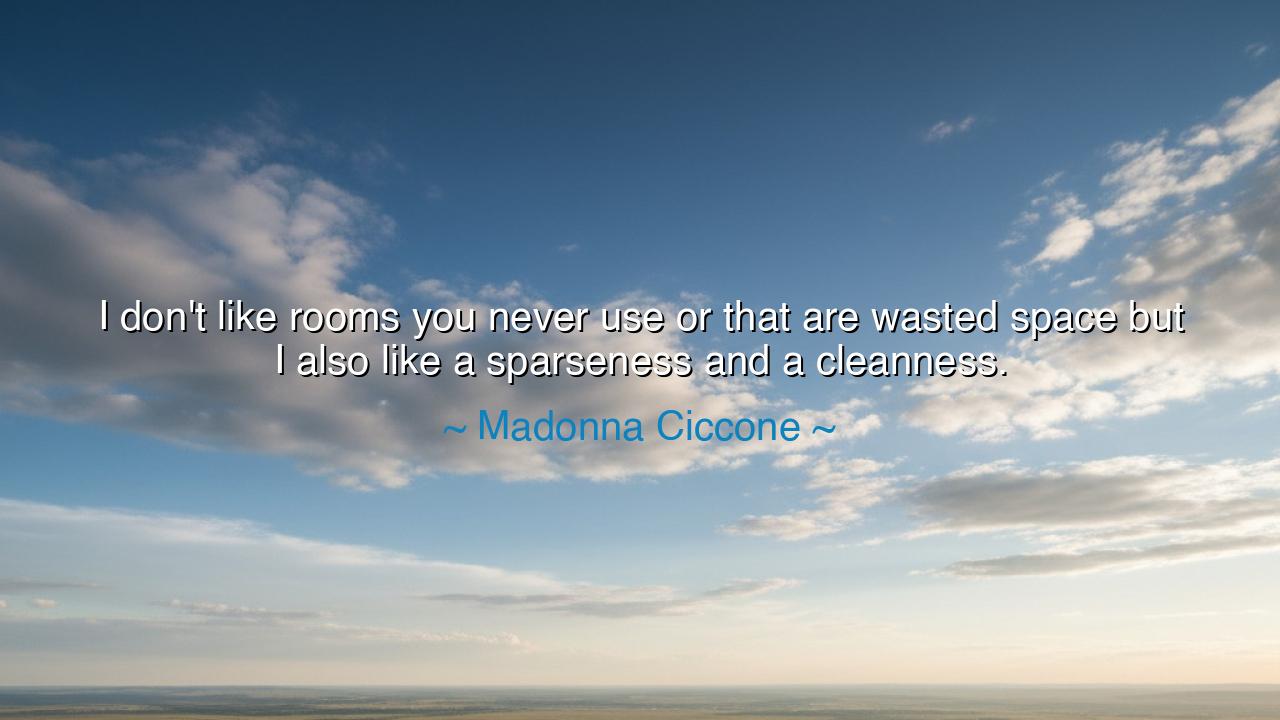
I don't like rooms you never use or that are wasted space but I
I don't like rooms you never use or that are wasted space but I also like a sparseness and a cleanness.






Hear, O listeners, the words of Madonna Ciccone, spoken with the simplicity of one who has known both abundance and emptiness: “I don’t like rooms you never use or that are wasted space, but I also like a sparseness and a cleanness.” Though her words appear to concern the arrangement of a house, they are in truth a parable for life itself. For what is a dwelling but a reflection of the soul, and what is space but the measure of how we choose to live within our days?
The meaning is twofold. First, she warns against waste—the gathering of places, possessions, or pursuits that serve no purpose, that lie dormant like empty halls. To keep rooms never entered is to cling to illusions, to surround oneself with abundance that has no life within it. Such wastefulness breeds stagnation, for unused spaces are like unexamined parts of the spirit, gathering dust. Yet second, she praises sparseness and cleanness—the deliberate removal of excess, so that what remains is purposeful, sharp, and alive. This is not poverty, but freedom: the freedom to live uncluttered, to dwell with intention.
The origin of such wisdom lies deep in the traditions of many peoples. The Stoics of ancient Rome taught that one should live simply, holding only what is necessary for virtue and peace. In Japan, the art of Zen design prizes empty space as much as form, teaching that simplicity is not lack but balance. In both, the principle is the same: that true strength is not in filling every corner, but in leaving room for the spirit to breathe. Madonna’s words stand in this lineage, a modern echo of ancient truths.
Consider the tale of Diogenes the Cynic. Surrounded by a world that prized luxury, he chose to live in a barrel with little more than a cloak and a cup. When he saw a boy drink water from his hands, Diogenes threw away his cup, saying he had found someone more simple than himself. His life was not about deprivation but about sparseness, the stripping away of what was unnecessary so that truth could shine more clearly. Though Madonna speaks of rooms and houses, her vision too carries this spirit: a life unburdened by waste, yet dignified by order and clarity.
And yet, balance is essential. For she does not call for emptiness alone, but warns against rooms never used. Even simplicity can become false if it forgets to live. To remove too much is to starve the soul, just as to hoard too much is to suffocate it. The wisdom is in harmony: let every space serve its purpose, and let no possession or place be idle, but let each be infused with life, beauty, and meaning.
The lesson, O listener, is profound: do not waste your space, whether it be the rooms of your home or the hours of your life. Do not gather excess for the sake of appearance, nor let corners of your existence lie unused. Instead, cultivate sparseness—the clarity that comes from letting go of what is unnecessary. Keep only what serves life, what brings peace, what awakens joy. For in this balance lies both simplicity and richness, both humility and abundance.
Therefore, in practice, look around your home, your work, your heart. Ask: what rooms lie unused, what corners lie stagnant? Ask too: what clutter fills my life without purpose? Then act—empty what must be emptied, but breathe life into what must be lived. For in the marriage of cleanness and use, of simplicity and vitality, you will find not only order in your dwelling but peace in your soul. And thus Madonna’s words, though spoken lightly, become a teaching of the ancients: to live with intention, neither wasting nor hoarding, but walking the golden path of balance.






AAdministratorAdministrator
Welcome, honored guests. Please leave a comment, we will respond soon